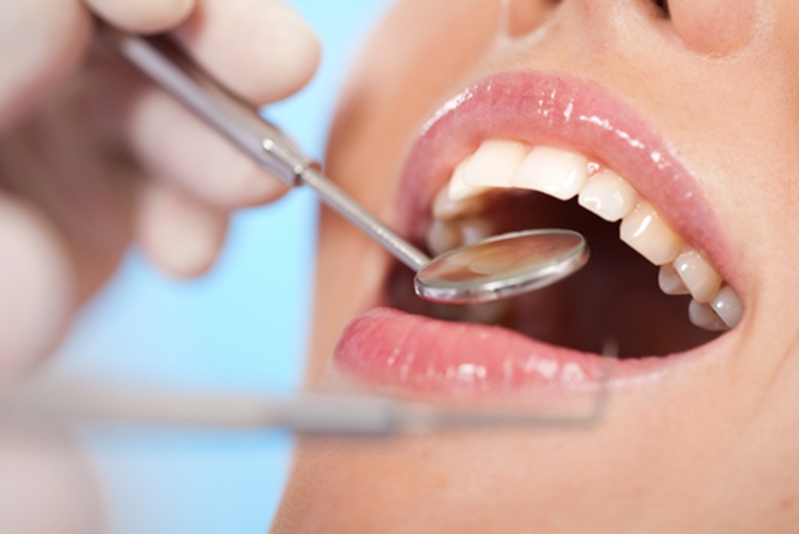
Gum is a staple in women's purses, men's pockets and kids' backpacks. Between its great taste and ability to give you fresh breath, the gooey treat is loved by all. Perhaps that's why nearly 100,000 tons of chewing gum are consumed each year.1 A common concern for many people is whether gum actually helps with oral health. Many big-name gum companies like Trident and Orbit even advertise their products as dental health tools. So, how true is this marketing strategy? Here's how chewing gum affects your oral health:
Beat bad breath
Bad breath, otherwise known as halitosis, can be caused by food particles getting stuck in your mouth and rotting. As the food decomposes, particularly proteins such as meat and fish, a foul-smelling gas is emitted.2 Though you can remove these bits of food by brushing your teeth after eating, gum can be used to assist in the removal of small particles, which will be picked up by the stickiness of the gum.
There are many causes for bad breath, and removing the food particles won't cure them all. For example, onions and garlic can lead to halitosis long after they're digested and enter the bloodstream. The blood flows to your lungs, and your breath will consequently have a foul odor. Mint-scented gum can help mask this problem, but it won't treat it at the source.
"Unwrap that stick of gum immediately after eating."
Fight cavities
The best time to unwrap that stick of gum is immediately after eating. When you eat, the sugar and carbohydrates react with the bacteria in your mouth in what is frequently referred to as "acid attacks." Essentially, the acid in your mouth starts eating away at the enamel. Without sugar-free chewing gum, these attacks could last up to an hour. Chewing gum cuts that time down to less than 20 minutes.3 As a result, your risk for cavities is reduced. Additionally, sugar-free gum contains Xylitol, which is a sweetener replacement. One study revealed that this ingredient can eliminate some of the bacteria in your mouth that causes cavities.4 Specifically, Xylitol prevents the cavity-causing bacteria Streptococcus from adhering to your teeth.5
Part of gum's cavity-fighting power also comes from the fact that chewing it can increase your saliva production. Saliva helps neutralize and rinse away the bacteria in your mouth that causes cavities.
Nourish dry mouth
The extra production of saliva doesn't just fight tooth decay, it can also help diminish symptoms of dry mouth. This condition causes dryness in the mouth or throat, bad breath, difficulty chewing and swallowing, gum irritation and change in your sense of taste.6 Not only do these issues increase your risk for cavities, but they cause discomfort. Just chewing gum can help add moisture to the mouth and erase these problems.
Harden tooth enamel
Aside from protecting enamel from acid attacks, some chewing gums can actually help harden it. Some manufacturers are starting to include an ingredient in these products called casein phosphopeptide-amorphous calcium phosphate (CPP-ACP), otherwise known by its trademarked name Recaldent.7 This substance can remineralize and harden tooth enamel, which can make your teeth more resistant to decay and yellowing.

Certain chewing gums may be able to harden your enamel.
Avoid other unhealthy habits
Many people use chewing gum for weight-loss purposes. For some dieters, it helps when trying to avoid eating unhealthy foods. This same strategy can be used for helping your teeth. Instead of taking a sip of that acidic, cavity-causing soda or munching on sugary cookies, chew on a piece of gum.
Precautions to take
Chewing gum has clear benefits for dental health, but it's important that you take the necessary precautions. First, only sugar-free gum carries these advantages, and brands with the American Dental Association (ADA) seal of approval are best. Otherwise, you're just adding to the bacteria and acid in the mouth. Additionally, you should never chew gum if you're wearing braces. The sticky substance could damage the wires and prevent braces from properly correcting your teeth.
Finally, though chewing gum can promote better oral health, it's not a substitute for proper daily dental care. As such, make sure you're still brushing your teeth twice a day and flossing once. Additionally, visit a dentist at least every six months. Low cost dental care is available for those with a dental discount card.
_____________________________________________________________
1. "Chewing Gum Statistics," Statistic Brain Research Institute, July 7, 2014. http://www.statisticbrain.com/chewing-gum-statistics/
2. "What is bad breath? What is halitosis? What causes bad breath?" Christian Nordqvist, Medical News Today, Oct. 7, 2009. http://www.medicalnewstoday.com/articles/166636.php
3. "Sugar-free chewing gum," British Dental Health Foundation. https://www.dentalhealth.org/tell-me-about/topic/caring-for-teeth/sugar-free-chewing-gum
4. "Xylitol for caries prevention," J. Peldyak, KK Makinen, U.S. National Library of Medicine. http://www.ncbi.nlm.nih.gov/pubmed/12592919
5. "Chewing gum: helpful or harmful?" Delta Dental. https://www.deltadentalins.com/oral_health/gum-chewing.html
6. "Dry Mouth," Mayo Clinic. http://www.mayoclinic.org/diseases-conditions/dry-mouth/basics/symptoms/con-20035499
7. "Gum That Is Good For Your Teeth: Too Good To Be True?" Wendy J. Woudstra, Colgate.
http://www.colgate.com/en/us/oc/oral-health/basics/nutrition-and-oral-health/article/sw-281474979063161
